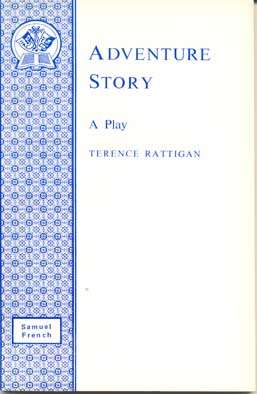Adventure Story (play)
Adventure Story is a 1949 play by the English dramatist Terence Rattigan.[2] The play tells the story of Alexander the Great and his conquests.[3]
| Adventure Story | |
|---|---|
 First edition cover (published by Samuel French Ltd.) | |
| Written by | Terence Rattigan |
| Date premiered | 17 March 1949[1] |
| Place premiered | St. James's Theatre |
| Original language | English |
In this play Rattigan portrays the historical Alexander faithfully, at the same time revealing that his life was what it was because he was the kind of person who very well might have wept because nothing remained to conquer.
The play focuses on the transformation of Alexander after his conquest of Persia from a military adventurist to an uncompromising despot with grand vision of a world empire which estranges him from his erstwhile friends. Driven by a deep-felt insecurity, he has to kill people close to him including even the father figure Cleitus. He tries to justify his actions in the name of his dreams of the world empire, but is haunted by loneliness in the end
The play holds a deeper significance, that the conquests of Alexander were actually trials to find himself and achieve spiritual enlightenment, through becoming a god (see Theosis).
The play ends with a nihilistic tone, that Alexander was to die and fade after all, his last words in the play are 'Who is to succeed me to the throne of Asia? Who shall I condemn to death?'[4]
Original production
The play opened at the St. James's Theatre on 17 March 1949,[5] with Paul Scofield in his first starring West End role, as Alexander.[2][4]
Adaptations
The BBC transmitted a live TV version of the play in 1950, starring Andrew Osborn as Alexander; and another in 1961, a recording of which has survived, directed by Rudolph Cartier, with Sean Connery in the role.[6][7] Of his performance, The Times wrote, "certain inflexions and swift deliberations of gesture at times made one feel that the part had found the young Olivier it needs."[8]
References
- Martial Rose (2003). Forever Juliet: The Life and Letters of Gwen Ffrancon-Davies, 1891-1992. Larks Press. pp. 129–. ISBN 978-1-904006-12-1.
- "terencerattigan". terencerattigan.
- "Adventure Story". www.samuelfrench.co.uk.
- "Terence Rattigan plays: timeline and synopsis". 29 October 2017 – via www.telegraph.co.uk.
- George Watson; Ian R. Willison (1972). The New Cambridge Bibliography of English Literature. CUP Archive. pp. 508–. GGKEY:64CF45KC7C0.
- "Adventure Story (1950)".
- "Adventure Story (1961)".
- "Rattigan on DVD: Sunday Night Theatre: Adventure Story (BBC, 1961)". 28 October 2011.